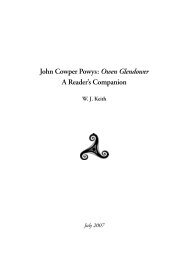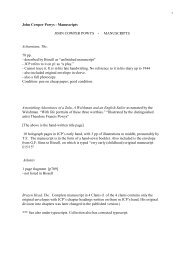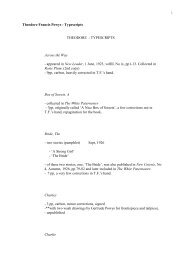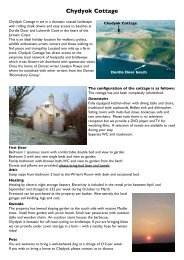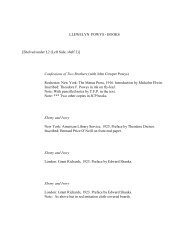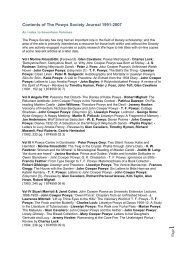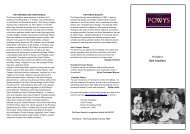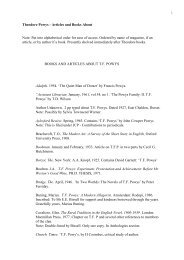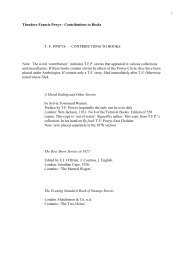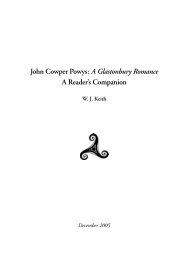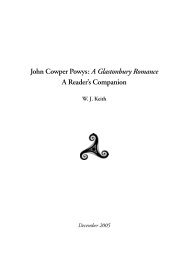J. C. Powys' Autobiography: A Reader's Companion - Site POWYS
J. C. Powys' Autobiography: A Reader's Companion - Site POWYS
J. C. Powys' Autobiography: A Reader's Companion - Site POWYS
You also want an ePaper? Increase the reach of your titles
YUMPU automatically turns print PDFs into web optimized ePapers that Google loves.
16 <strong>Autobiography</strong><br />
Confucius (454–5, 639, 642, 649) — Chinese<br />
thinker (551–478 BC), founder of Confucianism.<br />
Conrad (178, 498, 511, 620) — Joseph Conrad<br />
(1857–1924), Polish-born English novelist, author<br />
of Heart of Darkness, Lord Jim, Nostromo, Victory,<br />
etc. JCP wrote an essay on him in Suspended<br />
Judgments, and “John Cowper Powys on<br />
Conrad’s Chance.”<br />
Constantinople (125) — The modern Istanbul.<br />
Conversations with Eckermann (180) — A work by<br />
Goethe, listed by JCP in his One Hundred Best<br />
Books. Eckermann (q.v.) was one of Goethe’s<br />
German contemporaries, and his disciple.<br />
“cooled a long ago in the deep-delvèd earth”<br />
(402; cf. 297) — From Keats’s “Ode to a<br />
Nightingale” (l.12). Also quoted in Rodmoor (119),<br />
A Glastonbury Romance (588), and Powys on<br />
Keats (69).<br />
Cooper, Fenimore (594–5) — James Fenimore<br />
Cooper (1789–1851), American writer, author of<br />
the “Leatherstocking” novels. His “Lake” (595) is<br />
Lake Otago at Cooperstown (the usual spelling),<br />
New York State.<br />
Cooper, Nancy (238–9) — A local character in<br />
Montacute whom JCP introduces into Wood and<br />
Stone. Llewelyn has an essay about her in<br />
Somerset Essays. See also Geard (10).<br />
Cooper Union (462) — New York’s leading<br />
institute at the time for free adult education,<br />
founded by the manufacturer Peter Cooper<br />
(1791–1883) in 1854. Its premises were “on Aster<br />
Place at Fourth Avenue, near the old Bowery”<br />
(Hoagland, n. pag.). Hoagland also gives a brief<br />
but useful account of the institution, and of JCP’s<br />
lecture style. See Peltier (internet).<br />
Corfe Castle (68) — On the so-called Isle of<br />
Purbeck, near Poole, in eastern Dorset. The castle<br />
was destroyed in 1646 by Cromwell's troops.<br />
“Corinth” (156) — A city in ancient Greece, home<br />
of the Corinthians to whom St. Paul wrote. JCP’s<br />
poem was privately printed at Oxford and<br />
constitutes his first publication. The full text is<br />
reproduced in Langridge (4–12).<br />
Corpus (84) — Corpus Christi College, the<br />
college at Cambridge attended by JCP along with<br />
a number of other members of the Powys family,<br />
including his father and Llewelyn. The Corpus<br />
Mission (196) would be a social-service venture of<br />
the college.<br />
Corpus Delicti (296) — A material thing in relation<br />
to which a crime has been committed—a legal<br />
term derived from Latin.<br />
Corpus Mundi (296) — The body of the world<br />
(Latin).<br />
Corpus Terraqueous (551) — Body of land and<br />
water, the globe (Latin). Cf. “terraqueous globe”<br />
(91).<br />
Corvo, Baron (411) — Pseudonym of Frederick<br />
William Rolfe (1860–1913), writer, painter, and<br />
Catholic convert, best known for Hadrian the<br />
Seventh (1904). His reputation was that of a<br />
decadent homosexual eccentric. Louis<br />
Wilkinson’s recollection of the final meeting<br />
differs somewhat from JCP’s; see Welsh<br />
Ambassadors (240–41) and Seven Friends (70–71).<br />
couple of miles’ walk (247) — This seems wrong,<br />
since Rodmell itself is approximately four miles<br />
from Lewes.<br />
Court House ((216) — Near Offham, four miles<br />
northwest of Lewes.<br />
Cousin Ralph — See “Shirley, Ralph.”<br />
Cousin Warwick (546, 599–600) — Warwick Powys,<br />
a remote cousin living in New Mexico, mentioned<br />
in the early diaries and letters; see Petrushka and<br />
the Dancer (48–51), Letters to Llewelyn (II 71–72),<br />
and John and Frances (I 175–6). The Meaning of<br />
Culture is dedicated to him. JCP once wrote to<br />
Theodore that there were “more stories about<br />
him rather to be heard than revealed” (“John<br />
Cowper Powys’s Letters in America ...” [74]). What<br />
little information about him is known has been<br />
gathered by Susan Rands in “Some Powys<br />
Cousins.”<br />
Cowper (103, 249, 357) — William Cowper<br />
(1731–1800), English poet and hymn-writer, best<br />
known for Olney Hymns (1779) and for his long<br />
poem The Task (1785). JCP’s mother was<br />
descended from the Cowper family, hence his<br />
middle name.<br />
crack ... in the laws of cause and effect (445; cf.<br />
531) — A favourite JCP concept, occurring in most<br />
of the major novels, including A Glastonbury<br />
Romance (149, 265).<br />
“Crane of Ibycus” (573) — Cranes are supposed<br />
to have hovered over the murderers of Ibycus, a<br />
poet of Samos in ancient Greece, after he had<br />
called upon them in his last moments to avenge<br />
his death. Also mentioned in A Glastonbury<br />
Romance (428). JCP may have derived the story<br />
from Act II of Goethe’s Faust (Part 2).<br />
Cranford (141) — Elizabeth Gaskell’s Cranford<br />
(1853) is a novel about a town of that name<br />
dominated by elderly maiden ladies.<br />
Crewkerne (204) — A town in southern Somerset,<br />
southwest of Montacute.<br />
Crime and Punishment (258, 445–6) — A novel by<br />
Dostoievsky (q.v.), published in 1866. The detail of<br />
Sonia and the yellow ticket (258) seems to refer to<br />
her registration as a prostitute (Part 1, ch.2).<br />
Croce (545) — Benedetto Croce (1866–1952),<br />
Italian philosopher and writer. So, “Crocean”<br />
(545, 602).<br />
Cro-Magnon (482) — A prehistoric race of early<br />
human beings. The name, which is that of a



